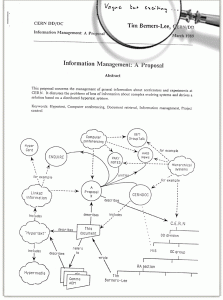“Vague but exciting…,” was the response Sir Tim Berners-Lee received when he submitted a proposal for an information management system (aka the world wide web) to his supervisor in March of 1989. Three decades later, we have hit a key milestone, and approximately half the world is online. For most of us, it’s difficult to imagine a life without the internet, where the original intent was to connect humanity. It has gone on to provide us instantaneous access to the world, enabling people in isolated corners of the globe to plug into resources, information, support and opportunities. We’ve witnessed its power in rallying people behind noble causes and connecting people across time zones. We live in an age of instant global connectivity and there’s obviously much to celebrate.
Birthdays are often a time for reflection and birthday wishes, and these practices date back to early Greek civilization. The Greek lit candles (representing the glow of the moon) on the round cake offered to Artemis, the Goddess of the Moon. They believ ed that the smoke emanating from blown candles carried prayers and wishes to the Gods who lived in the skies. On this milestone birthday, Sir Tim Berners-Lee, the inventor of the Internet, has also been reflecting and sharing his wishes. He has mixed feelings on the evolution of the Internet and its current state today, issuing a “cri-de-coeur” to the world.
ed that the smoke emanating from blown candles carried prayers and wishes to the Gods who lived in the skies. On this milestone birthday, Sir Tim Berners-Lee, the inventor of the Internet, has also been reflecting and sharing his wishes. He has mixed feelings on the evolution of the Internet and its current state today, issuing a “cri-de-coeur” to the world.
With increased access to the web, a digital divide still persists. With connectivity to new online friends, social isolation and loneliness threaten society as the next health epidemic. With a megaphone to amplify our voices and provide us with a platform for freedom of speech, comes an opportunity for voices to also spew hatred and bully behind screened veils. With ease of access and convenience to make online transactions, comes an opportunity for scammers and hackers to commit crimes. With access to information on just about any topic you can imagine, also comes an opportunity for organizations to prey upon our data with perverse incentives. Often times this is without our understanding or consent, as a result of “mumbo jumbo” terms and conditions. With the intent to do good, also comes the potential for unintended consequences. But Sir Tim Berners-Lee wants to put an end to that, “Given how much the web has changed in the past 30 years, it would be defeatist and unimaginative to assume that the web as we know it can’t be changed for the better in the next 30. If we give up on building a better web now, then the web will not have failed us. We will have failed the web.”
He has challenged us all to help the internet mature from the “digital adolescence” it is stuck in, and has set forth a Contract for the Web with core principles where he has challenged:
- Governments to translate laws and regulations for the digital age, protecting people’s rights and freedom, especially when private sector interests threaten public good
- Companies to put in place better business practices so that pursuit of profits isn’t at the expense of human and data rights, democracy, equality, privacy and security
- Citizens to hold everyone accountable demanding that entities respect the web as a global community built to connect humanity
The principles are simple in theory, and it’s a call to action challenging each and everyone of us to do our part, helping the internet grow up. Adolescents can experience challenging times before they come respectable adults, but it’s up to us to provide that lifeline. Every monumental discovery, journey, invention, movement-started with someone. All it takes is one person to tip the scales and make a difference. Are you in? Back to celebrating a milestone birthday and making those birthday wishes come true…If enough people wish for the same thing, MAGICAL change is possible. What can we do together to take this one step further?







Thanks for this, Sarah! Importantly, the other big 2019 anniversary is the 25th anniversary of the browser in 1994 – a signal moment for a lot of reasons. More to come on this!